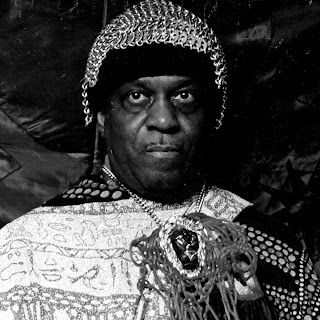Collaborative projects, generally, do not interest me as much. I generally find it more interesting when an individual takes over the collective and shapes it according to his artistic vision.
Many such ventures start democratically. Soon enough, however, the fledgling dictator mounts a coup de etat and becomes the leading musical director. Captain Beefheart & His Magic band started with all members on equal terms. Soon enough, Beefheart fired his band and acquired an impressionable crop of younger musicians who would do whatever he wanted (they would also be less resistant to the idea of playing 'weird' music, instead of the blues standards the first Magic Band were keener to perform). The Fall also had a similar development. (The young roadies who handled the first group's equipment soon found themselves on stage performing the music.)
The leading despot often tries to manufacture the oddest stage act. One of the most striking examples is that of the avant-jazz titan Sun Ra. Sun Ra claimed he came from Saturn (a gas planet?!). Although this may seem as mere promo talk, he staunchly defended this claim. Once he was put under hypnosis and, lo and behold, he still claimed that he came from Saturn.
Sun Ra
His group was called the 'Sun Ra Arkestra.' Originally it started as an ensemble which would play swing and old-style big band jazz. Soon Sun Ra began to implement unusual rhythms, time signatures, noises, chants, Egyptian melodies and astringent solos in what became a fascinating sound world.
This was a enormous ensemble, comprising way over twenty members. They were all ensnared in a small house, adhered to Sun Ra's cosmic claims and were never allowed to contact family members or friends. Even more strikingly, if Sun Ra was dissatisfied with the performance of a member, on a world tour he would often desert him and leave the member stranded in a foreign country. (The CIA soon told him that he would have to stop this habit.)
Of course, there were Beefheart's antics during the rehearsals of Trout Mask Replica which have been documented in an earlier post. After the coup de etat mounted by The Fall's Mark E. Smith, he has continued to exert his rule for over thirty years. He fires members at will, subjects them to his erratic behaviour and, although most of the band members share song-writing credits, if you don't do as told you are most certainly fired.
Mark E. Smith
Although the music itself may be composed or arranged by the ensemble, it is generally steered by the leash of the leader. It is interesting to note that none of the members who have left Captain Beefheart or The Fall have ever produced any material of worth. John French may have masterminded the arrangements of most of Beefheart's music, but his sporadic solo work is generally bland and hardly ever memorable. The numerous members that have left The Fall disappear and never leave a trace. Hardly any group of an ex-Fall member has made a strong impact.
But it is an interesting symbiosis. Although the leader is the centre of attention, the project can never survive or work without the backing band. Without his herd of acolytes and slaves, the despot is rendered helpless and impotent.
Generally, these projects bear the idiosyncrasy of the maker. It is also an interesting work ethic. Most jazz leaders employ a group of musicians, take them on world tours but they work under the constraints of his regiment. Miles Davis, of course, worked with the greatest luminaries in jazz. All his work bears his own language, in all the eclectic genres and crossovers he worked in.
So, the advantages of musical despotism are manifold. Their backing groups do bear the brunt of their tempers, so we must all acknowledge their hard work and input (after all, many of these groups are subjected to strenuous rehearsals). Many of these unique individuals do recognise, however, that sometimes creativity does not always work in the name of democracy.


1 comment:
Interesting piece. I think the classic example of this is Pink Floyd. They began as a fully democratic unit, writing 'Dark side of the moon' together (which indicates that unequivocally great works of art can be created collaboratively), but from there on Roger Waters slowly but surely assumed dominance and complete creative control. It's remarkable, reading into the band's history, just how Machiavellian his tactics were, in that by the time of The Wall, the entire concept and almost all the arrangement was his creation and his formerly equal band mates were now merely session musicians. (In fact, he fired keyboardist Rick Wright but was then forced to hire him to play on the hugely elaborate tour that followed. Because of the tour's scale and ambition, the 3 remaining Floyd members lost money whereas Wright, because he was an 'employee' actually made money!)
Post a Comment